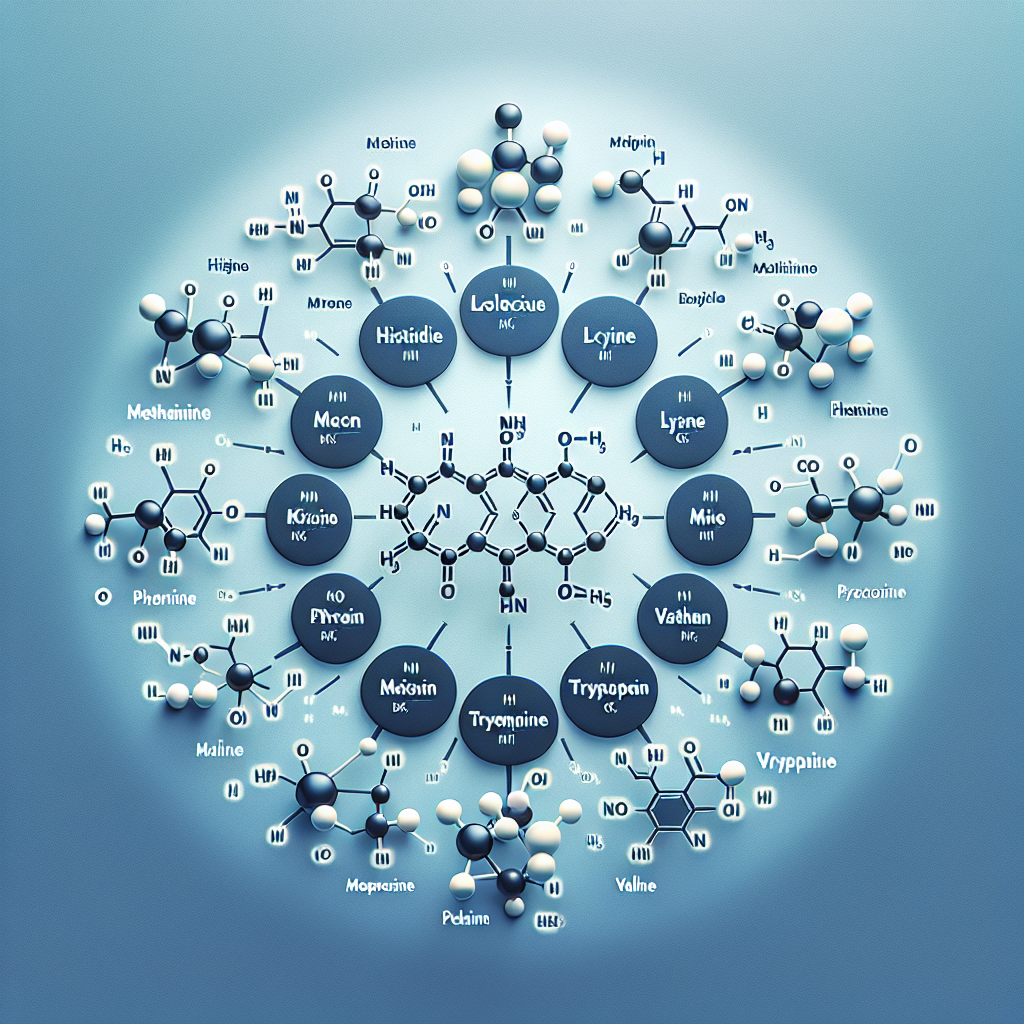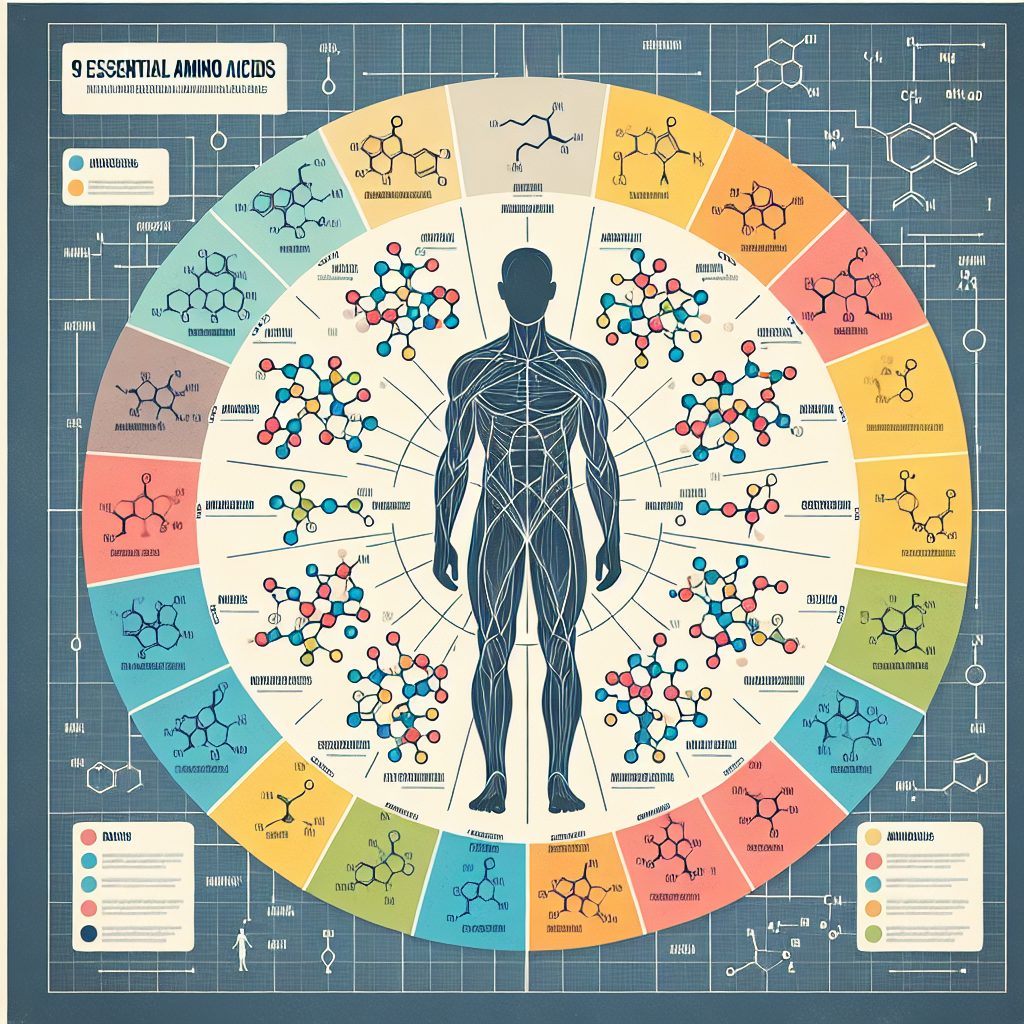When it comes to the building blocks of life, amino acids stand front and center. These remarkable compounds are the foundation of every protein in your body, from the keratin in your hair to the enzymes that digest your food. But not all amino acids are created equal, and understanding the difference between those your body can produce and those it cannot is crucial for maintaining optimal health.
So, how many essential amino acids are there? The answer is nine. These nine essential amino acids cannot be synthesized by the human body and must be obtained through our diet. Unlike non-essential amino acids that our bodies can create internally, these nine are truly “essential” because without them, our cellular functions would grind to a halt.
The Fundamental Role of Amino Acids
Amino acids are organic compounds that combine to form proteins, which are critical to virtually every biological process in your body. They contain an amino group and a carboxyl group, along with a side chain that varies between different amino acids, giving each its unique properties and functions.
Proteins, which are made up of various combinations of amino acids, are responsible for:
- Building and repairing tissues
- Creating enzymes and hormones
- Supporting immune function
- Facilitating cellular communication
- Providing structural support to cells
- Transporting nutrients throughout the body
Of the 20 standard amino acids used by our bodies, only nine are classified as essential. The term “essential” doesn’t mean they’re more important than the others—it simply indicates that our bodies lack the metabolic pathways to produce them internally. Therefore, we must get these nine essential amino acids from the foods we eat or through supplementation.
The Nine Essential Amino Acids: Nature’s Vital Nutrients
Let’s explore each of the nine essential amino acids and understand their unique roles in maintaining our health:
1. Phenylalanine
Phenylalanine serves as a precursor to several important neurotransmitters, including dopamine, epinephrine (adrenaline), and norepinephrine. These neurotransmitters play crucial roles in mood regulation, attention, and response to stress. Phenylalanine is also converted into another amino acid called tyrosine, which is involved in producing thyroid hormones that regulate metabolism.
2. Valine
As one of the three branched-chain amino acids (BCAAs), valine is particularly important for muscle metabolism. It helps stimulate muscle growth and tissue repair and is involved in energy production. Athletes and active individuals often focus on adequate valine intake because it can help maintain muscle tissue during intense physical activity by serving as a potential energy source for muscles.
3. Tryptophan
Perhaps best known for its presence in turkey and its reputed connection to post-Thanksgiving drowsiness, tryptophan is vital for more than just promoting sleep. It serves as a precursor to serotonin, a neurotransmitter that regulates mood, appetite, and sleep patterns. Tryptophan is also involved in the production of melatonin, the hormone that helps control your sleep-wake cycles, and niacin (vitamin B3), which supports energy metabolism.
4. Threonine
Threonine is a major component of structural proteins like collagen and elastin, which are essential for healthy skin and connective tissues. It also plays a critical role in immune function and the production of antibodies. Additionally, threonine helps maintain proper protein balance in the body and is important for digestive health as it contributes to the production of intestinal mucus, which protects the digestive tract.
5. Isoleucine
Another branched-chain amino acid, isoleucine is heavily involved in muscle metabolism and energy regulation. It’s particularly concentrated in muscle tissues and is essential for hemoglobin formation, blood sugar regulation, and energy production during exercise. Isoleucine also supports wound healing and hormone production.
6. Methionine
Methionine is a sulfur-containing amino acid that plays a critical role in metabolism and detoxification. It assists in the breakdown of fats, helps remove heavy metals from the body, and is necessary for tissue growth and the absorption of zinc and selenium. Methionine also contributes to the production of cysteine, another amino acid that’s important for protein synthesis and antioxidant production.
7. Histidine
Initially considered essential only for infants, histidine is now recognized as essential for adults as well. It’s crucial for the production of histamine, which is involved in immune responses, digestion, sexual function, and sleep-wake cycles. Histidine also helps maintain the myelin sheath that protects nerve cells, supports growth and repair of tissues, and is vital for producing red and white blood cells.
8. Leucine
The third branched-chain amino acid, leucine, is perhaps the most notable for its role in muscle protein synthesis. It directly activates a pathway called mTOR (mammalian target of rapamycin), which stimulates muscle growth and prevents muscle breakdown. Leucine also helps regulate blood sugar levels, promotes wound healing, and supports growth hormone production.
9. Lysine
Lysine is essential for proper growth and plays a crucial role in calcium absorption and collagen formation. It supports the immune system, helps produce enzymes and hormones, and is necessary for energy production. Lysine is also known for its potential role in preventing cold sores caused by the herpes simplex virus, as it may help inhibit viral replication.
Sourcing Essential Amino Acids: A Dietary Approach
Now that we understand how many essential amino acids are there and their critical roles, let’s explore how to obtain them through our diet:
Animal-Based Sources
Complete proteins containing all nine essential amino acids are abundant in animal-based foods:
- Meat: Beef, pork, and poultry are excellent sources of all essential amino acids.
- Fish and Seafood: Fish like salmon, tuna, and cod provide high-quality protein with a complete essential amino acid profile.
- Eggs: One of the most bioavailable protein sources with an ideal balance of essential amino acids.
- Dairy Products: Milk, cheese, yogurt, and whey protein contain all nine essential amino acids in varying proportions.
Plant-Based Sources
Contrary to popular belief, plant-based diets can provide all essential amino acids when properly planned:
- Complete Plant Proteins: Quinoa, buckwheat, hemp seeds, chia seeds, and soy products (tofu, tempeh, edamame) contain all nine essential amino acids.
- Complementary Proteins: Combining different plant foods can create complete protein profiles—for example, rice with beans, whole grain bread with nut butter, or hummus with whole wheat pita.
- Legumes: Lentils, chickpeas, and various beans are rich in lysine but may be lower in methionine and cysteine.
- Nuts and Seeds: Almonds, pumpkin seeds, and sunflower seeds offer varying profiles of essential amino acids.
For those with dietary restrictions, food allergies, or specific health conditions, supplementation can be a valuable way to ensure adequate intake of all essential amino acids. This is where NutraAeon’s commitment to quality ingredients becomes particularly relevant, as the purity and bioavailability of amino acid supplements directly impact their effectiveness.
Strategic Importance for Supplement Formulation
Understanding how many essential amino acids are there and their functions is crucial for effective supplement formulation. Forward-thinking supplement manufacturers recognize that targeted amino acid profiles can address specific consumer needs:
Performance and Recovery
Branched-chain amino acids (leucine, isoleucine, and valine) have gained significant attention in sports nutrition. With leucine serving as the primary trigger for muscle protein synthesis, many performance supplements feature a higher ratio of leucine compared to the other BCAAs. This strategic formulation helps support recovery from intense exercise and may promote muscle growth when combined with proper training.
Cognitive Function and Mood Support
Amino acids like tryptophan and phenylalanine are precursors to neurotransmitters that regulate mood, focus, and cognitive function. Supplement manufacturers can leverage this knowledge to develop formulations that support mental well-being and cognitive performance, particularly important in our high-stress, productivity-focused society.
Sleep and Relaxation
Tryptophan’s role in serotonin and melatonin production makes it valuable for sleep-support formulations. When paired with other nutrients that support relaxation, such as glycine and magnesium, supplement manufacturers can create effective products for the growing sleep-health market.
Immune Support and Overall Health
Amino acids like lysine and threonine support immune function, while methionine contributes to detoxification processes. Strategic combinations of these essential amino acids can help create comprehensive health supplements that address multiple body systems simultaneously.
For nutritional product developers and health-conscious product manufacturers, understanding the specific roles and synergistic relationships between essential amino acids opens new avenues for innovative formulation. NutraAeon’s high-purity amino acid series provides these manufacturers with the quality ingredients necessary to create effective, science-backed products.
The NutraAeon Difference: Quality Ingredients for Exceptional Products
As a trusted global partner for nutritional ingredient sourcing, NutraAeon understands the critical importance of amino acid quality in supplement formulation. Our commitment to excellence is reflected in our rigorous testing protocols and quality control standards that exceed USP and FDA expectations.
When developing products that contain essential amino acids, manufacturers need confidence in their raw materials. NutraAeon provides that assurance through:
- Pharmaceutical-Grade Purity: Our amino acid series undergoes extensive testing to ensure the highest levels of purity and potency, free from contaminants and adulterants.
- Documented Traceability: We provide complete supply chain visibility from source to delivery, giving manufacturers the transparency needed to build consumer trust.
- Technical Expertise: Our team of nutritional scientists offers guidance on optimal amino acid ratios for different applications, helping manufacturers create products that deliver on their promises.
For small businesses and R&D companies developing innovative nutritional products, access to premium-quality amino acids can be the difference between a mediocre supplement and one that truly delivers results. NutraAeon’s commitment to empowering these companies through technical expertise and superior ingredients aligns perfectly with the growing demand for effective, science-backed supplements.
Conclusion: The Essential Nine for Optimal Health
So, how many essential amino acids are there? The answer remains nine—phenylalanine, valine, tryptophan, threonine, isoleucine, methionine, histidine, leucine, and lysine. These nine remarkable compounds are truly essential for human health and function, playing roles in everything from muscle growth to neurotransmitter production, immune function, and beyond.
Whether you’re a consumer looking to optimize your health, a healthcare professional guiding patients toward better nutrition, or a manufacturer developing the next breakthrough supplement, understanding these nine essential amino acids provides a foundation for making informed decisions.
At NutraAeon, we’re proud to support the nutritional supplement industry through our commitment to quality, transparency, and empowerment. By providing premium-quality amino acids and other nutritional ingredients, we help forward-thinking businesses create exceptional health products that make a real difference in consumers’ lives.
As the understanding of essential amino acids continues to evolve, NutraAeon remains dedicated to staying at the forefront of nutritional science, ensuring that our partners always have access to the highest-quality ingredients backed by the latest research.


